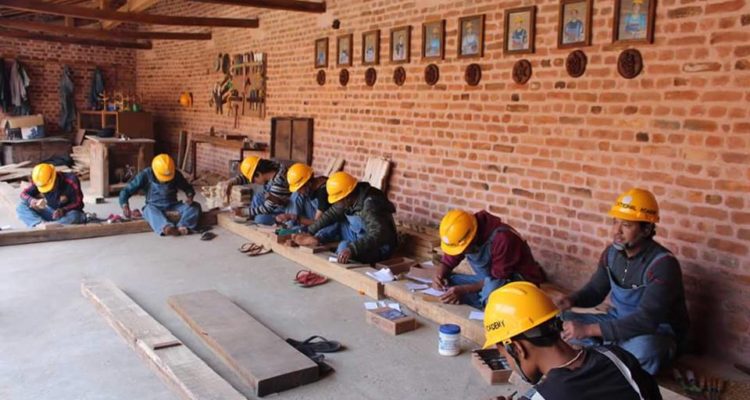Sundhar Timalsena, a 16-year-old, is trying his best to bring the shape of Buddha from a wooden log. He is one of many youths learning wooden carving at Rabindra Puri Foundation For Conservation. He is enrolled in one among the many available vocational training in Nepal.
Rabindra Puri founded Rabindra Puri Foundation For Conservation in 2010 with the aim of conserving the assets of Nepal, traditional architectures and, with time, uplifting of community schools in remote areas in Nepal. Puri also started Nepal Vocational Academy by donating 50% of his property to the cause. Under the campaign, they are constantly in search of those people, like Sundhar, who are not well-equipped to chase their dream of becoming a successful person in life.
In their pursuit, the Foundation saw Sundhar and his passion to pursue higher education, which sat well with their campaign. They embraced him under their roof and got him involved in the Nepal Vocational Academy. Rabindra Puri, with his initiative, tries his best to produce competent and market-oriented skilled workers with different traditional skills giving them practical experience and employment.

Photo Courtesy: Facebook/ Rabindra Puri
Under Nepal Vocational Academy:
The vocational training course, in the Academy, is one year long. Those enrolled are trained to be different skilled like wood-crafters, stone-crafters, carpenters and masons. In the morning, they go to schools and colleges and spend their afternoons in the Academy, learning and polishing their skills.
The training has two phases, where the first is nine months long and the second is three months long. In the first phase, they get all the hands-on experience using all the necessary equipment. Whereas in the last three months, the Foundation provides them with suitable jobs and they get practical experiences.
Nepal Vocational Academy of Panauti, in a year, has about twenty students from all over Nepal. Over the training period, students stay in the hostel free of cost while the Foundation provides scholarships for their higher-level education. Even after their training, the Foundation continues to support them with scholarship until their earning is enough to sustain them.
Not only in Panauti, but the Foundation also runs Vocational Academy in Bhaktapur. With the increasing demand for skilled workers in the market, it already has plans to soon open Nepal Vocational Academy at the university level.
The Impact:
Belonging to the poor family background it wasn’t easy for Sundhar to pursue further studies. “After completing my SEE, I was worried what else can I do for future. And I knew that only education can lead to my career. But, knowing the background of my family I didn’t have guts to ask my family for money,” says Sundhar. “This foundation has helped me a lot, by providing scholarship for my school and by training me free of my cost.”
One of the students, Dinesh Tamang says, “The Foundation has provided me with new life by giving me the scholarships, and training to compete in the market. I can now earn money with the help of the training. As the Foundation covers all the expenses, I can save my earning. I am truly grateful for all this Foundation has provided.”
Now, Sundhar and Dinesh are confident the skills they have learned can help sustain their lives. “After the completion of this training, I will open a small factory in my village and serve them. This will help me earn and continue my further studies at the same time,” says Sundhar.
Why Vocational Training in Nepal is crucial?
Such vocational training in Nepal encourages the young population to be more involved in the Nepali market. Vocational trainings can not just train students and the young population but also empower those who are in need. It enables them to return back to their community and contribute through their skills.
And in Nepal, vocation training can also contribute to decrease the huge unemployment problem, caused by a large number of youths leaving the country in search of jobs. At the same time, it can decrease the impending shortage of skilled manpower Nepali market is facing. Similarly, it can help to decrease the market’s dependency on foreign manpower or resources even for the smallest of works.


Leave a Reply
You must be logged in to post a comment.